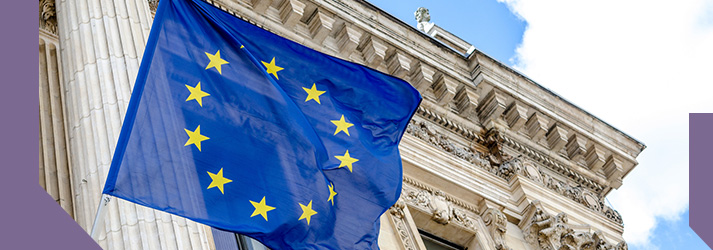March 2018
European markets were rattled during March over the prospect of a possible trade war with the US following President Donald Trump’s decision to impose a 25% levy on steel imports and a 10% levy on aluminium imports. Later in the month, the US opted to exempt several countries – including EU member states – from the tariffs, although the exemption will only stand until 1 May.
- Angela Merkel was formally re-elected as German Chancellor
- Brexit negotiations progressed, but the issue of the Irish border remained unresolved
- Eurozone inflation is expected to remain below target into 2020
To view the series of market updates through March, click here
European markets were rattled during March over the prospect of a possible trade war with the US following President Donald Trump’s decision to impose a 25% levy on steel imports and a 10% levy on aluminium imports. EU Commissioner Jyrki Katainen stated, “We expect that the EU as a whole will be excluded as a key political, security and economic partner that trades fairly with the US”. European Commission President Jean-Claude Juncker said that the EU would “react firmly and commensurately to defend (its) interests”. Meanwhile, European Central Bank (ECB) President Mario Draghi warned that “unilateral decisions are dangerous”, although he believes the initial impact of the decision is unlikely to be substantial. Later in the month, the US opted to exempt several countries – including EU member states – from the tariffs, although the exemption will only stand until 1 May, when President Trump decides whether or not it should remain in place. The Dax Index fell by 2.7% during March, while the CAC 40 Index declined by 2.9%.
“Central bank officials are becoming more optimistic about the eurozone’s economic outlook”
The minutes from the March meeting of the ECB’s Governing Council showed that policymakers had removed a longstanding pledge to expand its programme of asset purchases if necessary. The omission indicated that central bank officials are becoming more optimistic about the eurozone’s economic outlook. Nevertheless, President Mario Draghi insisted that the ECB’s support remains intact, exemplified by the central bank’s ongoing bond-purchase programme and its ultra-low interest rate. Looking ahead, the ECB expects the eurozone’s economy to expand by 2.4% in 2018 and by 1.9% in 2019. Inflation is predicted to remain below the central bank’s target of “below but close to 2%” into 2020.
Germany’s Bundestag formally re-elected Angela Merkel as German Chancellor, making this her fourth term in office and ending months of political wrangling. In response to the news, European Council President Donald Tusk welcomed the “clear pro-European stance of the new German government” at a time when the European Union faces “significant challenges”. Elsewhere, as Brexit negotiations made progress over the terms of the transition, EC President Donald Tusk called for both parties to use this “positive momentum” to settle unresolved issues including the future of the border between Northern Ireland and Ireland. He also said, “The UK will be our closest neighbour and we want to remain friends and partners… that are as close as possible”.
A version of this and other market briefings are available to use in our newsletter builder feature. Click here




